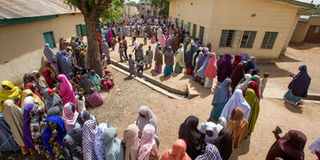Anxiety as Nigeria awaits results

Voters wait to cast their ballots at a polling station on the outskirt of Kano during the presidential elections on March 28, 2015. PHOTO | TOM SAATER |
What you need to know:
- Sea, and borders closed and movement restricted in bid to prevent Boko Haram attacks
- Nigeria has some 68.8 million registered voters
- There are fears that the most populous African country may sink into violence once the results of the hotly contested poll are announced
- Given the fact that Nigeria has a history of election-related unrest, there was widespread and mounting anxiety prior to Saturday’s long-awaited polls.
After a particularly convoluted build-up towards the process, Nigerians finally went to the polls in what was expected to be a closely contested General Election.
Nigeria has some 68.8 million registered voters out of a total population of 173 million, and the poll has been widely touted as the most important political event in Africa so far this year.
Saturday’s presidential election, in particular, was also being seen as the closest race in the country’s history, with incumbent Goodluck Jonathan, 57, facing a strong challenge from former military ruler Muhammadu Buhari, who at 72 is also the oldest presidential candidate in the race.
Buhari, who headed a military government in the 1980s, describes himself as a “converted democrat”. Through his formidable All Progressives Congress (APC) party, which has been pushing an agenda of “change”, he has been giving Jonathan and his People’s Democratic Party (PDP) supporters a run for their money.
As for yesterday’s voting, it encompassed the presidential election, which was being held simultaneously with elections for the 360-seat National Assembly. While there were 1,780 candidates vying for a place in the latter, another 739 candidates were out to win places in the 109-seat Senate.
Once done with yesterday’s polls, whose results were supposed to be announced within 48 hours of the closure of the election exercise, Nigerians will be casting their ballots again on April 11, this time around to choose new governors and state assemblies for 29 of the 36 states.
Given the fact that Nigeria has a history of election-related unrest, there was widespread and mounting anxiety prior to Saturday’s long-awaited polls. It was, however, reassuring that the two top contenders for the presidency appeared keen to prevent a repeat of 2011, when 1,000 people were killed in clashes after the results were announced.
Remarkably, on Thursday in the capital Abuja the two frontrunners for the presidency went out of their way to sign a pledge of non-violence and repeated their commitment to peaceful elections.
That development aside, during the build-up to wards yesterday’s event, matters were further complicated by concerns about possible attacks and bombings at vulnerable targets, including polling stations, by the dreaded Boko Haram Islamist militants.
The insurgents have been the bane of the country’s leadership for several years, and their activities have left between 10,000 and 15,000 people dead since 2009, ironically also when the country resumed civilian rule.
The militants, however, suffered major setbacks during the run-up to yesterday’s polls. For instance, on Friday, less than 24 hours before the commencement of voting, the Nigerian military announced the recapture of Gwoza, the last remaining large town occupied by Boko Haram in Borno state.
Significantly, it is from Gwoza that Boko Haram leader Abubakar Shekau on August 24 last year announced the formation of a so-called Islamic caliphate that was reportedly named ‘Dar ul Hikima’.
Despite such decisive victories against the beleaguered Boko Haram militants, the national security forces still made unprecedented calls for vigilance amid reports that Nigeria’s land and sea borders were closed at midnight on Wednesday.
The border closure would be in effect until the same time on Saturday, after the end of polling for both the presidential and parliamentary elections. The move came even as army chief Kenneth Minimah warned that anyone who caused conflict during the polls would have to contend with “organised violence” from the security forces.
Apart from the border closure, the army chief assured Nigerians that adequate security arrangements had been made for the polls, including an eight-hour restriction on movement after the opening of the polling stations.
In the meantime, with campaigning for the presidential elections due to wind to a close at midnight on Thursday, the two leading candidates delivered their final messages to supporters ahead of the crunch vote.
The presidential poll was held amid predictions that the contest would be a cliff-hanger affair. Pointedly, observers have for long underscored the fact that Nigeria, touted as Africa’s leading economy and top oil producer, is almost evenly split between a Muslim-majority north and a largely Christian south.
PULLED SUPPORT
Not surprisingly Jonathan and Buhari, who also did battle during the last polls in 2011, have traditionally pulled support from their respective regions.
Given the closeness of the race, when all the chips are down acceptance of the poll results will clearly be key to preventing violence. Gratefully, during a national broadcast on Friday President Jonathan asked Nigerians to vote peacefully.
Pleading with his compatriots to “set an example of political maturity for other emerging democracies”, the incumbent president added that no political ambition could justify violence.





